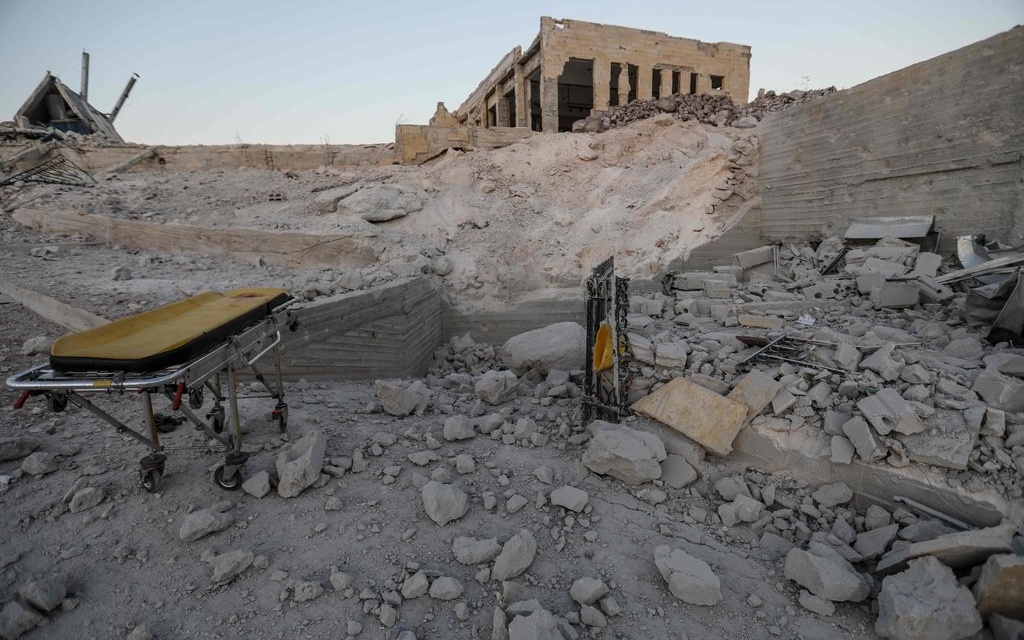Kafr Nabl Hospital in northwest Syria after it was bombed by pro-Assad warplanes, July 2019 (Omar Haj Kadour/AFP/Getty)
In a 185-page report, the UN has blamed the Assad regime and its “allies” for the bombing of hospitals and schools in opposition areas of northwest Syria, but limits any criticism of Russia.
The investigators, submitting the document to the Security Council, concluded that in five of six cases studied, “the government of Syria and/or its allies had carried out the airstrike”.
In one case, an attack on a refugee camp, the inquiry attributed responsibility to an anti-Assad faction.
The board of inquiry, convened in September, initially considered seven bombings between April and July 2019 in and near Idlib Province. One site, a hospital, was later excluded because it did not match criteria set by Secretary-General António Guterres.
The coordinates of all the sites had been shared with Russia, in an effort to prevent attacks. However, the summary held back from directly naming Moscow, whose airstrikes since September 2015 kept Bashar al-Assad in power. The bombings, including of civilian sites, then enabled pro-Assad forces to reclaim territory while killing tens of thousands of civilians.
A detailed New York Times investigation last November, including of audio recordings, considered one of the sites examined by the UN team. The Times concluded that Russia was responsible for the bombing of the hospital in Kafr Nabl in Idlib Province.
4 Hospitals Bombed in 12 Hours — How Russia’s “War Crimes” Destroy Syria
Human rights activists criticized the UN evasion of the naming of Russia.
Human Rights Watch assessed, “The refusal to explicitly name Russia as a responsible party working alongside the Syrian government… is deeply disappointing.”
Richard Gowan, the UN director of the International Crisis Group, said:
This is a deliberately mealy-mouthed report.
On a charitable reading, this summary contains enough oblique and tentative statements confirming the Syrian government and Russians’ responsibility.
On a less charitable reading, this is an effort to minimize offending Moscow that reflects the fact that U.N. officials believe that continued cooperation with Russia is key to the future of humanitarian operations in Syria.
Physicians for Human Rights has documented at least 595 attacks on medical facilities and personnel in Syria’s nine-year conflict, with the Assad regime and Moscow responsible for 536. More than 280 have occurred since Russia’s intervention in September 2015.
The War on the Civilians
Russia and the regime bombed every medical facilities at least once in eastern Aleppo city in 2016, in a months-long siege and assault to reoccupy the area. More than two months of intensive strikes on civilian areas, including a deadly chlorine attack, brought the surrender of the East Ghouta area near Damascus in spring 2018.
From April 2019 to March 2020, the Russian-regime attacks focused on northwest Syria, seizing almost all of northern Hama Province and part of southern and eastern Idlib. About 2,000 civilians were killed, and more than 1 million displaced before a Turkish-Russian agreement on March 5 for a ceasefire and an effective partition of Idlib.
More than 70 medical facilities have been damaged or destroyed in the northwest offensive. The New York Times investigation detailed the bombing of four hospitals in 12 hours.
The UN investigation was mandated last July by a rare diplomatic petition from the Security Council, demanding that Secretary-General Guterres open an inquiry. Russia, unable to veto the petition, expressed its fury.
Guterres said the limit of the investigation to seven incidents was due to the absence of UN personnel on the ground and blockthe regime’s blocking of access to sites.
The report was initially to be submitted at the end of 2019 but was delayed until March. Russian diplomats have reportedly blocked any public release.
Susannah Sirkin, the director of policy at the Physicians for Human Rights, summarized:
The UN Secretary-General’s extremely limited investigation was doomed from the beginning. It failed to account for the overwhelming evidence that the Syrian and Russian governments have executed a consistent and brutal strategy of bombing hospitals, schools and civilian sites.
Assad regime and Russian English-language sites ignored the UN report.

